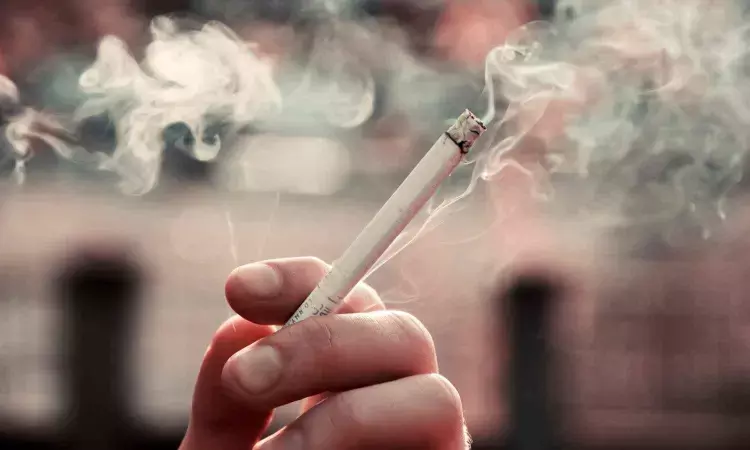- Home
- Medical news & Guidelines
- Anesthesiology
- Cardiology and CTVS
- Critical Care
- Dentistry
- Dermatology
- Diabetes and Endocrinology
- ENT
- Gastroenterology
- Medicine
- Nephrology
- Neurology
- Obstretics-Gynaecology
- Oncology
- Ophthalmology
- Orthopaedics
- Pediatrics-Neonatology
- Psychiatry
- Pulmonology
- Radiology
- Surgery
- Urology
- Laboratory Medicine
- Diet
- Nursing
- Paramedical
- Physiotherapy
- Health news
- Fact Check
- Bone Health Fact Check
- Brain Health Fact Check
- Cancer Related Fact Check
- Child Care Fact Check
- Dental and oral health fact check
- Diabetes and metabolic health fact check
- Diet and Nutrition Fact Check
- Eye and ENT Care Fact Check
- Fitness fact check
- Gut health fact check
- Heart health fact check
- Kidney health fact check
- Medical education fact check
- Men's health fact check
- Respiratory fact check
- Skin and hair care fact check
- Vaccine and Immunization fact check
- Women's health fact check
- AYUSH
- State News
- Andaman and Nicobar Islands
- Andhra Pradesh
- Arunachal Pradesh
- Assam
- Bihar
- Chandigarh
- Chattisgarh
- Dadra and Nagar Haveli
- Daman and Diu
- Delhi
- Goa
- Gujarat
- Haryana
- Himachal Pradesh
- Jammu & Kashmir
- Jharkhand
- Karnataka
- Kerala
- Ladakh
- Lakshadweep
- Madhya Pradesh
- Maharashtra
- Manipur
- Meghalaya
- Mizoram
- Nagaland
- Odisha
- Puducherry
- Punjab
- Rajasthan
- Sikkim
- Tamil Nadu
- Telangana
- Tripura
- Uttar Pradesh
- Uttrakhand
- West Bengal
- Medical Education
- Industry
Second-hand smoke exposure during childhood leaves its mark on children's DNA, claims research

Children exposed to second-hand smoke at home are more likely to show certain changes in the epigenome, which can alter the way genes are expressed. These epigenetic changes could influence the development of diseases in the future. This is the main conclusion of a study led by the Barcelona Institute for Global Health (ISGlobal), a centre supported by the "la Caixa" Foundation. The results, published in Environment International, highlight the need to reduce exposure to second-hand smoke, especially in children's environments.
Our DNA acts as an instruction manual for the body. Without changing the contents of the "book" (i.e. the gene sequence), tobacco smoke can add "marks" to certain pages, affecting the way these instructions are read. One of these marks, DNA methylation, is one of the main epigenetic mechanisms, allowing gene expression to be turned on or off.
Second-hand smoke’s mark on the DNA
While the effects of maternal smoking during pregnancy have long been known to affect the epigenome, this research is among the first to show how second-hand smoke exposure during childhood may also have an effect.
The study included data from 2,695 children from eight European countries: Spain, France, Greece, Lithuania, Norway, the Netherlands, the UK and Sweden. The participants were aged 7-10 years and were volunteers from six cohorts of the Pregnancy and Childhood Epigenetics Consortium (PACE).
Using blood samples from participants, the team looked at the level of methylation at specific DNA sites along the genome and related it to the number of smokers in the household (0, 1, or 2 or more).
DNA methylation changes were identified in 11 regions (called CpGs) that were associated with exposure to second-hand smoke. Most of these regions had also been linked in previous studies to direct exposure to tobacco in active smokers or during pregnancy. In addition, six of them are associated with diseases for which smoking is a risk factor, such as asthma or cancer.
"Our study shows that second-hand smoke during childhood leaves its mark at the molecular level and can alter the expression of genes that influence disease susceptibility in adulthood", says Marta Cosin-Tomàs, ISGlobal researcher and first author of the study.
A global problem with long-term consequences
Despite increasing regulation of smoking in public places, the household remains a major source of second-hand smoke exposure for children. In 2004, it was estimated that 40% of children worldwide were exposed to tobacco smoke. Childhood exposure to this pollutant not only increases the risk of respiratory and cardiovascular disease, but can also affect neurological development and immune function.
"The results suggest that second-hand smoke in childhood leads to epigenetic changes similar to those observed with intrauterine exposure to tobacco or active smoking. This underlines the urgency of implementing comprehensive measures to reduce childhood exposure to tobacco smoke, both at home and indoors", says Mariona Bustamante, ISGlobal researcher and senior author of the study.
"It is not a question of appealing to the individual responsibility of families: exposure to tobacco is a public health problem and hides an issue of social inequality. Socio-economic and environmental factors, together with the influence of powerful commercial interests, make it difficult to reduce exposure to second-hand smoke in certain households," concludes Marta Cosin-Tomàs.
Reference:
Marta Cosin-Tomas, Thanh Hoang, Cancan Qi, Giulietta S. Monasso, Ryan Langdon, Simon Kebede Merid, Lucinda Calas, Paula de Prado-Bert, Rebecca Richmond, Vincent VW Jaddoe, Liesbeth Duijts, John Wright, Isabella Annesi-Maesano, Regina Grazuleviciene, Marianna Karachaliou, Gerard H. Koppelman, Erik Melén, Olena Gruzieva, Martine Vrijheid, Paul Yousefi, Janine F. Felix, Stephanie J. London, Mariona Bustamante, Association of exposure to second-hand smoke during childhood with blood DNA methylation, Environment International, https://doi.org/10.1016/j.envint.2024.109204.
Dr Kamal Kant Kohli-MBBS, DTCD- a chest specialist with more than 30 years of practice and a flair for writing clinical articles, Dr Kamal Kant Kohli joined Medical Dialogues as a Chief Editor of Medical News. Besides writing articles, as an editor, he proofreads and verifies all the medical content published on Medical Dialogues including those coming from journals, studies,medical conferences,guidelines etc. Email: drkohli@medicaldialogues.in. Contact no. 011-43720751


